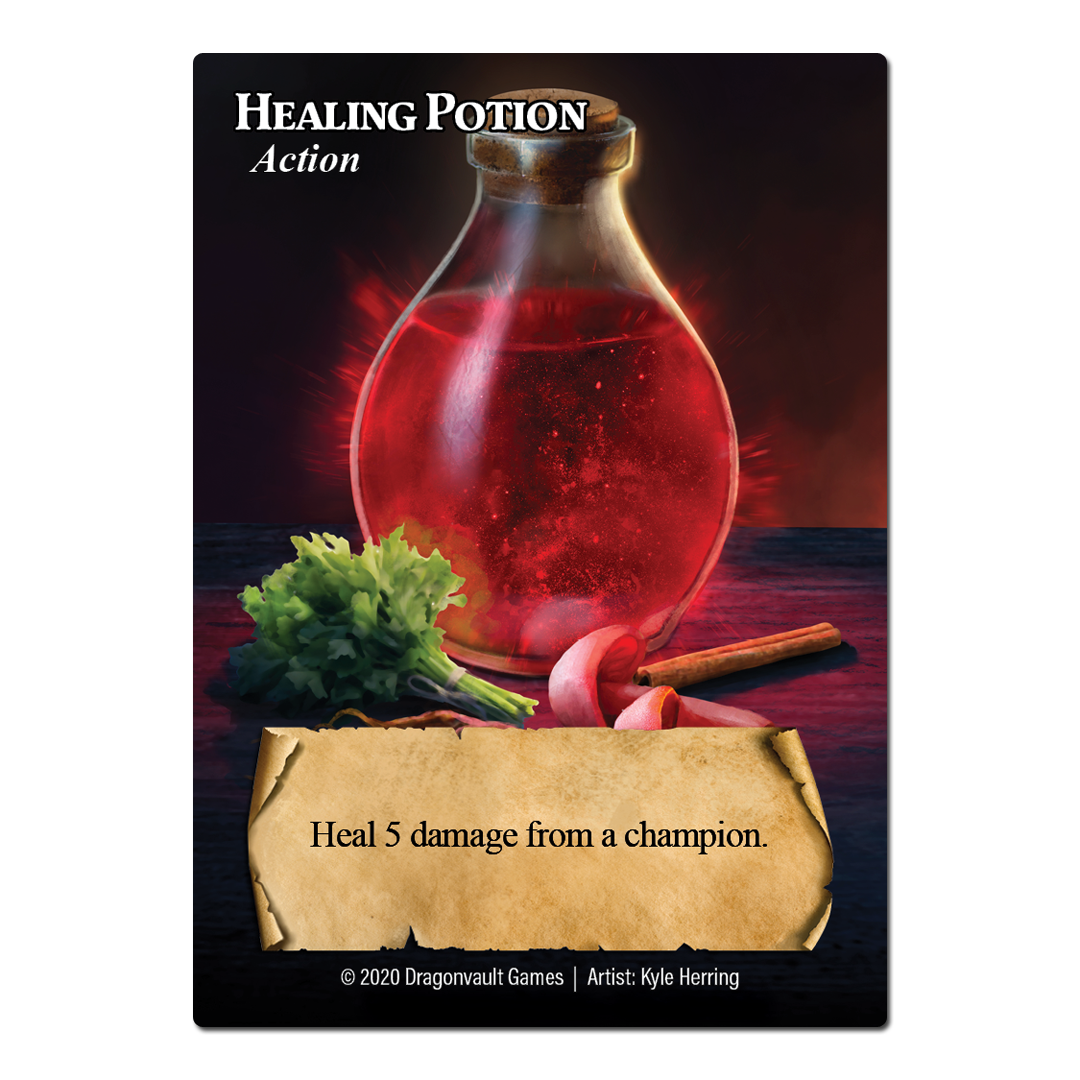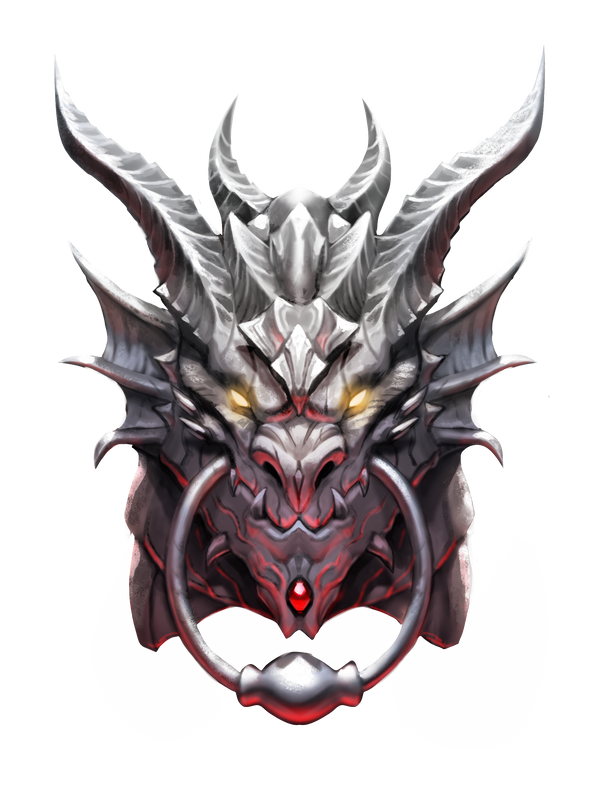How to Play
Setting Up the Game
Separate the cards into two piles. Cards with an arrowhead icon ➤ next to their name go into a face-down pile called the adventure deck. Put this in the center of the table and shuffle it. All other cards, such as the champions and extra Gold Coins and Food cards, go into the side deck.
Note—If you have a first edition copy of Dragonvault, there are no arrowhead icons to signify which cards belong in the adventure deck. Refer to the 'Adventure Deck Contents' section.
Note—In both first and second edition Dragonvault decks, there is an extra Gluttonous Ogre card. It is recommended to put this card into the adventure deck if you are playing a game with five or more players. Otherwise, keep it in the side deck.
Each player chooses a champion from the side deck. Or you can assign them randomly. Everyone begins the game with one Food card, and two Gold Coins cards. Take these cards from the side deck as well. This becomes your starting hand. Then, players whose champions have an ability that triggers at the start of the game, such as Ulric, will activate those abilities.
To determine who goes first, each player rolls a d6 (six-sided die). The person who rolls the highest begins the game. Then, the turn order goes clockwise from that person. If two or more players tie for the highest roll, roll again as many times as necessary to break the tie.
Note—Champion abilities are in effect when rolling for turn order. For example, Avadel will get +1 to these rolls, and Radin will deal 1 damage to all enemy champions if his owner rolls a 5 or a 6.
Turn Structure
At the start of your turn, you may play action or mercenary cards from your hand. There is no limit to the amount of cards you can play. Just keep in mind that mercenaries will require you to pay treasure. To pay treasure means to place treasure cards from your hand into the discard pile, until the required amount of treasure is met. The discard pile is a face-up stack of cards next to the adventure deck.
Note—You cannot "make change" with treasure cards. But it is possible to overpay. For example, if you wanted to play a Hired Muscle during your turn, you could discard a Gemstones card (worth 2 treasure), even though you only needed to pay 1 treasure. The extra 1 treasure that is left over will still be usable for the rest of the turn, so you could use it to play another Mercenary if you wanted to. Think of paid treasure like a "pool" which builds up for that turn only, and then disappears at the end of turn.
When you are done playing cards, draw a card from the adventure deck. If you draw an encounter card, such as a dragon or a trap, you must deal with it immediately. If it is any other type of card, put it into your hand. Your turn ends after you draw from the adventure deck. You cannot play a card that you just drew. You will have to wait until your next turn. The exception to this rule are response cards, such as the Invisibility Potion, which can be played anytime a certain thing (specified in the card text) happens. This may or may not be on your turn.
Taking Damage
During the game, champions may take damage. This might be from an encounter, or from an opponent's mercenary. Damage stays on a champion unless healed. To heal damage means to remove it from a champion. If at any point a champion accumulates damage equal to its toughness, that champion dies and its owner is out of the game.
Note—A champion cannot heal beyond its toughness. For example, let's say that you are playing as Celaine, a champion with 7 toughness, and during your previous turn, she took 1 damage from a Bear Trap. At the start of this turn, you roll a d6 to see if Celaine activates her healing ability. You roll a 5, which means that Celaine can heal 2 damage from a champion. You choose Celaine as the champion that receives this healing. Celaine doesn't go up to 8 toughness. Instead, the 1 damage is removed, and Celaine remains at her original toughness of 7. Think of damage as something which stacks on a champion, and is then removed by healing. You can use dice to track this, if you'd like.
Looting Another Player
If another champion dies during your turn, such as from one of your mercenaries for example, you may then loot that player's hand. To loot means to pick one card of your choice from their hand, and put it into your own hand.
Note—Looting specifically refers to the act of taking a card from a player's hand after their champion dies. Using an Expert Thief to take a card doesn't count as looting, even though you are still stealing from your opponent.
The Discard Pile
When a card is played, or an encounter is dealt with, it goes into the discard pile. A player can look through the discardpile at any point during their turn, but they must do so beforethey draw from the adventure deck. When a champion dies, thatplayer's hand goes into the discard pile (if that champion diedduring another player's turn, this happens after their hand islooted).
Declaring the Winner
Keep taking turns until the adventure deck runs out. Then, players with surviving champions reveal their hands. Theplayer with the most treasure wins the game.If two or more players tie, and one of them possessestheRelic, the player with theRelicwins the game. Otherwise, it is a true tie.
Types of Cards
Champion

A champion is a playable character. When you choose a champion, it represents you for the rest of the game. A champion's toughness is signified by the shield icon. Damage stays on a champion unless it is healed. If at any time your champion accumulates damage equal to its toughness, it dies and you are out of the game.
Tip — A d12 works well to track a champion's damage, because no champion has a toughness score of greater than 12.
Companion
A companion is another type of character that joins up with your champion to provide support. There is no limit to the number of companions you can have on the table at one time. Just like champions, companions stay out on the table until they are destroyed by accumulating damage equal to their toughness score. They also may have special abilities. Incoming damage is taken by the champion by default, but you may choose to have one of your companions take the damage, instead. If a companion dies, remaining damage does not spill over to the champion.
Action

Action cards can be played on your turn, before you draw from the adventure deck. Some examples of action cards are Food, Healing Potion, and Crystal Ball. There is no limit to the number of action cards you can play during your turn.
Response

Response cards can be played when a certain thing happens. This may be on your turn, or on someone else's turn. For example, Spirit of Retribution can be played when another player causes your champion to take damage.
Mercenary

Mercenary cards are played on your turn, like action cards, but they require you to pay treasure in order to play them. You can play as many mercenaries as you can pay for during your turn.
Encounter

Encounter cards must be dealt with as soon as they are drawn from the adventure deck. Dragons, such as Green Dragon, will require you to pay treasure, or they will damage your champion. Trap cards, such as Bear Trap, require you to roll a d6 to see what happens. Other encounters, like the Djinn or the Succubus, may help or hinder you. The Phoenix and Flood cards are encounters which require everyone on the table to participate. Group encounters like this resolve clockwise, starting with the person who drew the card. When an encounter has been dealt with, it goes into the discard pile.
The Side Deck
Put all other cards that are not in the adventure deck into a separate pile elsewhere. These form the side deck, and are not a part of the game (unless the Djinn adds treasure to your hand. Take these treasure cards from the side deck, and not from the adventure deck.) The side deck should consist of any unused champions, as well as any extra copies of Gold Coins and Food. If you are playing a game with four or less players, there will also be one Gluttonous Ogre in here as well.
Freezing
Sometimes, a card will cause a character to be frozen.
If a champion is frozen, its owner cannot play any cards, activate that champion's special abilities, or draw from the adventure deck until the beginning of their turn after next. At this time, the champion thaws.
If a d6 must be rolled while a champion is frozen, the roll automatically becomes a 1. If a champion takes damage while frozen, it thaws immediately afterward.
Companions, like champions, can also be frozen. While a companion is frozen, its special abilities cannot be activated, and it cannot take damage for a champion. But a player who controls a frozen companion can still play cards, and draw from the adventure deck, as long as thier champion is unfrozen.
Note—Passive abilities, such as Vorix's healing, will not apply while frozen.
Group Encounters
Some encounters will involve all players, such as the Phoenix, which has card text that reads, "Each player rolls a d6."
These cards are called group encounters, and they always resolve clockwise, starting with the person who drew the card. This means that the person who drew the encounter will face it first, then the person to their left, and so on, until every person has faced the encounter. Players may have to roll more than once depending on the card text.
After each player has faced a group encounter, it is discarded.
Note—Loot rules still apply during group encounters. This means that if any champions die, the player who drew the encounter will do the looting.
Team Games
Team games work slightly differently than regular, free-for-all games.
To play a team game, determine which players are allied before the game begins. These allegiances must be declared openly before any dice are rolled for turn order. From that point on, any card text that references an "enemy" or an "opponent" is referring to players that were not declared as allies at the start of the game.
During your turn, you may choose to give any number of cards to allied players. This may be action, treasure, or any other type of card. But this must be done before you draw from the adventure deck.
Looting rules still happen as normal. If a champion dies, the player whose current turn it is will be the one who loots.
If an encounter requires payment, it must be paid by the player who drew the encounter, unless the card text states otherwise.
At the end of the game, players reveal their hands. Then, the treasure totals are combined between allied players. The side with the highest treasure total wins the game. If both sides tie, the side with the most relics wins the game. Otherwise, it is a true tie.
